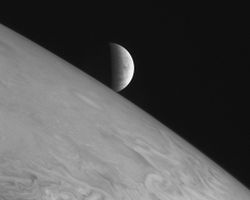Difference between revisions of "Europa"
From FenWiki
(Created page with '{{stub}} {{planetbox |name=Europa |image=Europa rising.jpg |orbit=670 900 km from primary (mean) |diameter=3138 km (equatorial) |gravity=0.134 g |year=n/a |day=Synchronous with p…') |
(copied relevant text from the "Tourism in Fenspace" page) |
||
| Line 21: | Line 21: | ||
== Europa in Fenspace == | == Europa in Fenspace == | ||
''blah blah monoliths and-we-all-know-the-'''2010'''-reference'' | ''blah blah monoliths and-we-all-know-the-'''2010'''-reference'' | ||
| + | |||
| + | Europa is home to many scientific teams trying to find life on the moon, so far with no success; visitors are often welcomed at these bases, but there's little to see unless you're a scientist. | ||
== Related Links == | == Related Links == | ||
Revision as of 22:56, 17 February 2010
 This Fenspace article is a stub. You can help FenWiki by expanding it.
This Fenspace article is a stub. You can help FenWiki by expanding it.
| Europa | |
 | |
| Planetary characteristics | |
|---|---|
| Orbit | 670 900 km from primary (mean) |
| Diameter | 3138 km (equatorial) |
| Surface Gravity | 0.134 g |
| Year | n/a |
| Day | Synchronous with primary |
| Mean Temperature | 102°K |
| Atmosphere | Trace |
Europa (also known as "Jupiter II") is the sixth moon of the planet Jupiter and the smallest of the four Galilean moons. It was discovered in 1610 by Galileo Galilei (and possibly independently by Simon Marius).
Europa in Fenspace
blah blah monoliths and-we-all-know-the-2010-reference
Europa is home to many scientific teams trying to find life on the moon, so far with no success; visitors are often welcomed at these bases, but there's little to see unless you're a scientist.
Related Links